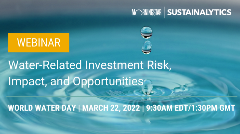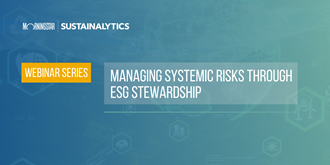Financing the Future: An Interview on High ESG Risk Industries and Opportunities for Banks
Companies in industrial conglomerates, steel, diversified metals, precious metals, and oil and gas producers can make take meaningful steps to reduce their material environmental, social, and governance (ESG) risk – and the negative impacts that go along with those risks. But they need guidance and access to finance. Read on to learn how banks are working with clients in these high-risk industries to set and meet targets for material improvements on ESG risk factors.
Governance in Brief – April 21, 2022
Shopify plans to approve Founder’s share Shopify will seek shareholder approval at the June 7 AGM for the creation of a new class of share – Founder’s share – for its chief executive and founder Tobi Lutke. The company’s current share structure comprises two classes of shares, Class A with one vote per share, and Class B with 10 votes per share. Class B shareholders currently control around 51% of the total voting power.
The Sustainalytics Podcast | Setting Up Your Corporate ESG Program for Success and Avoiding Early Obstacles
We discuss setting up your corporate ESG program for success and avoiding early ESG obstacles in this interview with Sustainalytics Corporate Solutions Director, Shilpi Singh. You’ll discover the importance of four ESG focus areas: leadership buy-in, planning and resourcing, ESG strategy, and reporting and communication.
The Emergence of Water Risk: From Marginal to Systemic
The past two decades have seen a surge in interest in environmental issues, mainly climate change, global warming, and fossil fuels. Yet, another equally important dimension - water scarcity - has thus far remained largely unexamined and has not been given adequate importance in the economic development agendas of many countries.
What's Happening in Sustainable Finance: Impact Reporting for Bonds, the Low-carbon Transition for the Cement Industry, and More
In addition to our detailed overview of recent developments in the green, social, and sustainability-linked finance space, in this episode we welcome special guest Simon Vacklen, Sustainalytics’ Corporate Solutions senior manager, to discuss impact reporting for use of proceed bonds.
Mass Timber in Construction - Big Buildings, Smaller Carbon Footprint
As an innovation in the industry, mass timber construction emits significantly less carbon than traditional concrete and metal structures, while modular construction ensures usability across many building types. This article reviews some of the concerns over structural strength, fire safety, regulatory compatibility, cost savings and the sustainability of increased forestry. It then examines current mass timber buildings and projects and looks at their viability as an alternative material for the future.
Governance in Brief – April 7, 2022
ISSB launches consultation on first two sustainability standards The International Sustainability Standards Board (“ISSB”) has published the exposure drafts for its first two standards. The proposals set disclosure requirements for 1. general sustainability-related financial disclosure, and 2. specific climate-related disclosure on Scope 1-3. Based on TCFD recommendations and derived from SASB Standards, the standards comprise all relevant sustainability topics – governance, strategy, risk management – as well as metrics and targets.
ESG Implications of Russia’s Invasion of Ukraine on the Chemicals Industry
The Russian invasion of Ukraine not only threatens global security, but it also raises some important ESG implications for several sectors, including the chemicals industry and particularly the agrochemical subindustry, as Russia exports over 10% of fertilizers globally.
Infographic | Start Your ESG Program: 4 Strategic Steps on the Journey to ESG Performance
In this infographic, we outline essential action-oriented steps to get you started on your ESG journey, including obtaining high-level executive buy-in, resourcing your efforts, strategic planning, and reporting the results of your program.
The EU Action Plan - Insights for Asia Pacific Investors
In 2021, the European Union adopted a strategy to redirect the flow of capital towards the transition to a sustainable economy but what does this mean and how does it impact investors outside of Europe? This webinar will look at the practical implications for investors operating in Asia Pacific.
Governance in Brief – March 31, 2022
Evergrande discloses USD 2.1 billion cash seizure China Evergrande Group has established an independent committee to investigate a USD 2 billion hole in the accounts of its primary operating subsidiary, Evergrande Property Services. While preparing its FY2021 accounts, the subsidiary discovered that a group of undisclosed banks had seized RMB 13.4 billion (USD 2.1 billion) of its deposits, approximately equivalent to its cash holdings as of June 2021, as security for third-party pledge guarantees.
Looking at ESG in Crypto, Blockchain, and Public Equities
Beyond the volatile crypto market, blockchain has several features that lend well to commercial applications. Blockchain can help improve the transparency, speed and efficiency of data transfers and monetary transactions. Businesses in multiple industries are using blockchain tools to enhance payment platforms and secure supply chain management systems. Sustainalytics’ latest Thematic Research report, An ESG Lens on Blockchain and Public Equities, surveys ESG risks and opportunities related to applications of blockchain technology that are being developed by listed companies across multiple sectors of the economy.
Russia, ESG Risks in Energy, and Corporate Citizenship
As the unprecedented situation in Ukraine continues to unfold, Russia’s energy industry has remained remarkably untouched by the waves of sanctions currently being deployed against the country, despite being arguably its most important sector. While the European Union and its allies have been cautious to avoid disrupting energy flows (unlike how sanctions are currently disrupting the flow of capital), international oil companies are responding to the crisis in their own capacity.













-(1200-x-600-px)-(1).tmb-thumbnl_rc.png?Culture=en&sfvrsn=d69966b3_4)

